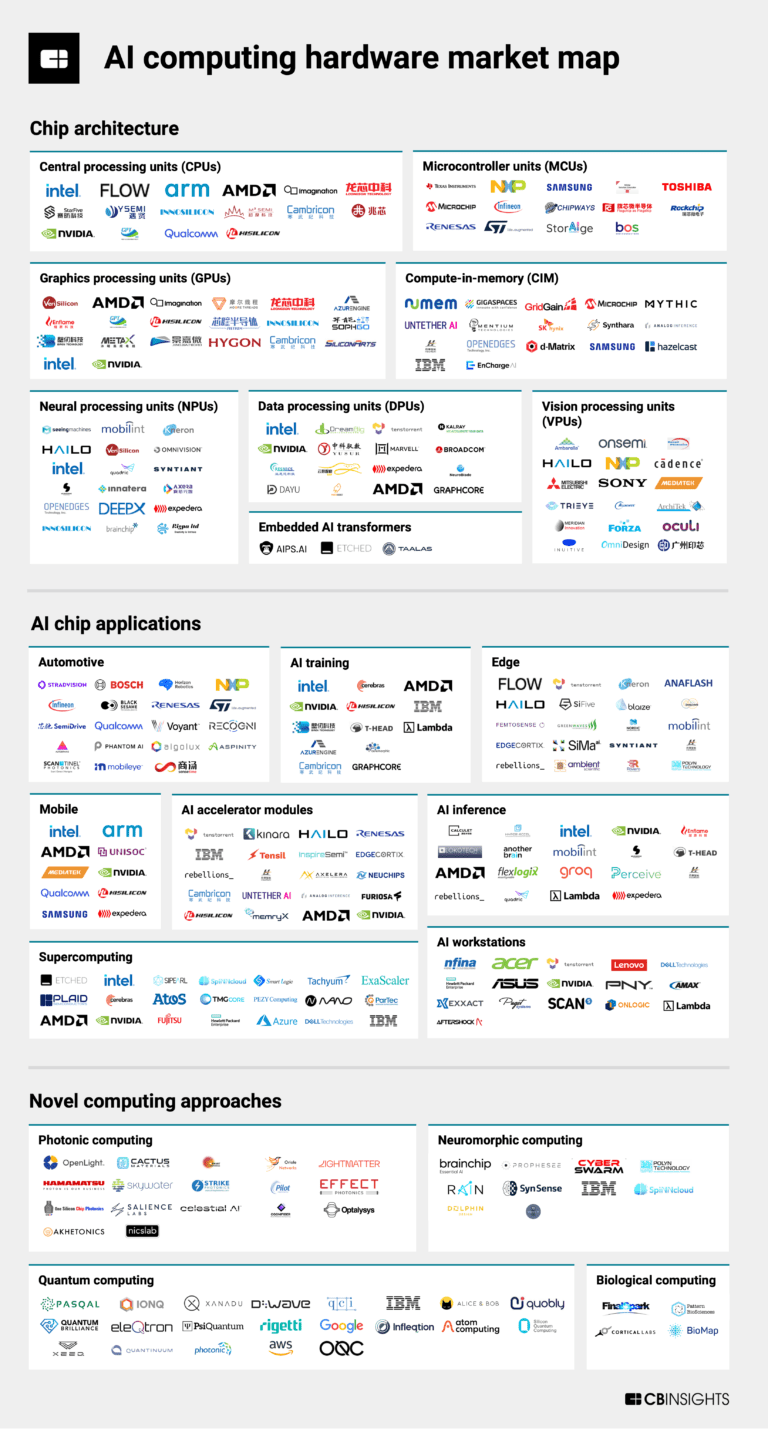
Groq
Founded Year
2016Stage
Series D - II | AliveTotal Raised
$1.003BValuation
$0000Last Raised
$640M | 2 mos agoMosaic Score The Mosaic Score is an algorithm that measures the overall financial health and market potential of private companies.
+95 points in the past 30 days
About Groq
Groq specializes in AI inference technology within the artificial intelligence sector. The company offers a hardware and software platform that is designed to provide compute speeds and energy efficiency for AI applications. It was founded in 2016 and is based in Mountain View, California.
Loading...
Groq's Product Videos


ESPs containing Groq
The ESP matrix leverages data and analyst insight to identify and rank leading companies in a given technology landscape.
The AI inference processors market develops specialized chips for efficiently executing pre-trained AI models in real-time applications. These processors prioritize low latency and energy efficiency, making them essential for tasks such as image recognition, natural language processing, and recommendation systems in devices such as smartphones, robotics, and autonomous vehicles. The market is expa…
Groq named as Leader among 15 other companies, including Advanced Micro Devices, Samsung Electronics, and NVIDIA.
Groq's Products & Differentiators
GroqRack™
For data center deployments, GroqRack provides an extensible accelerator network. Combining the power of an eight GroqNode™ set, GroqRack features up to 64 interconnected chips. The result is a deterministic network with an end-to-end latency of only 1.6µs for a single rack, ideal for massive workloads and designed to scale out to an entire data center.
Loading...
Research containing Groq
Get data-driven expert analysis from the CB Insights Intelligence Unit.
CB Insights Intelligence Analysts have mentioned Groq in 2 CB Insights research briefs, most recently on Sep 13, 2024.

Sep 13, 2024
The AI computing hardware market mapExpert Collections containing Groq
Expert Collections are analyst-curated lists that highlight the companies you need to know in the most important technology spaces.
Groq is included in 4 Expert Collections, including Unicorns- Billion Dollar Startups.
Unicorns- Billion Dollar Startups
1,244 items
Artificial Intelligence
14,767 items
Companies developing artificial intelligence solutions, including cross-industry applications, industry-specific products, and AI infrastructure solutions.
Semiconductors, Chips, and Advanced Electronics
7,204 items
Companies in the semiconductors & HPC space, including integrated device manufacturers (IDMs), fabless firms, semiconductor production equipment manufacturers, electronic design automation (EDA), advanced semiconductor material companies, and more
AI 100 (2024)
100 items
Groq Patents
Groq has filed 74 patents.
The 3 most popular patent topics include:
- parallel computing
- computer memory
- instruction processing

Application Date | Grant Date | Title | Related Topics | Status |
|---|---|---|---|---|
7/6/2022 | 6/4/2024 | Computer memory, Parallel computing, Video cards, Machine learning, Natural language processing | Grant |
Application Date | 7/6/2022 |
|---|---|
Grant Date | 6/4/2024 |
Title | |
Related Topics | Computer memory, Parallel computing, Video cards, Machine learning, Natural language processing |
Status | Grant |
Latest Groq News
Sep 20, 2024
Sign up By clicking “Sign Up”, you accept our Terms of Service and Privacy Policy . You can opt-out at any time by visiting our Preferences page or by clicking "unsubscribe" at the bottom of the email. Advertisement In February, Glean announced a $200 million funding round valuing the AI enterprise software startup at $2.2 billion. Normally, a founder would hop off the fundraising treadmill after such a close. But these are not normal times, and Glean has the kind of meteoric revenue growth that lights up the eyes of VCs, more than tripling annual recurring revenue over the past year. This story is available exclusively to Business Insider subscribers. Become an Insider and start reading now.Have an account? Log in . Almost overnight, founder Arvind Jain's inbox filled up with cold emails from other investors — hungry for a piece of the startup unicorn. "We kept telling people that, look, we just raised, we have a lot of capital, and we feel fine," Jain said. He added, "But then that inbound kept coming in, and at some point we said, OK, well, let's think about does it actually make sense for us." This month, Glean snagged another $260 million from investors such as Altimeter Capital and DST Global, in a deal that doubles its valuation to $4.6 billion. Advertisement The transaction is the latest in a string of dizzying back-to-back funding rounds at ever-higher valuations for a handful of AI startups that stand in stark contrast to the doldrums of the overall market for startups. "The funding velocity for top AI startups is extremely rapid right now, with some raising multiple large rounds within months," said Steve Brotman, founder and managing partner of Alpha Partners. "This reflects the massive investor excitement and FOMO around AI, but also creates risks of inflated valuations and unrealistic expectations." The search company Perplexity secured $62.7 million in funding in April, less than four months after it raised $73.6 million in a Series B round. And the round may not be done yet. In June, Bloomberg reported that it's having discussions with SoftBank to invest at a $3 billion valuation. A spokesperson for Perplexity declined to comment. The semiconductor company Groq is already exploring another funding round at a substantially higher valuation shortly after it locked up $640 million in a Series D round in August, according to two people with knowledge of the matter. A spokesperson for Groq declined to comment. Advertisement Sakana AI, a Tokyo-based AI research company founded by Google engineers in 2023, announced this month it raised a $100 million Series A funding round led by New Enterprise Associates, Khosla Ventures and Lux Capital. Earlier this year, Sakana raised $30 million in a seed funding round led by Lux Capital. Slingshot AI , which has built an automated mental health counselor, also raised separate rounds of funding just months apart. "What happens after these rounds is a lot of people don't get in, so there may be a billion dollars on the sidelines that's ready for the next round," said Gregg Hill, cofounder of Parkway Venture Capital, which invested in Figure AI, a robotics company valued at $2.6 billion. "I think that's also a reason why you see some of these rounds happening sooner than later." The have and have-nots The pace at which these AI startups are raising fresh rounds of capital has created a new dichotomy among tech founders. Unlike the tech boom that ended in 2020, where companies from crypto to consumer were raising huge rounds, the fervor this time is much more concentrated. "There's a have and have-not scenario right now where if you're an emerging AI company, despite maybe not having really proven much of anything from the standpoint of revenue or significant user traction, you might be able to get some wildly amazing valuation," said Matt Murphy, a partner at Menlo Ventures. "At the same time, you could be a $50 million business right now growing at 40%, and people might view you as uninteresting because you're not an AI company." Advertisement Dario Amodei is a former OpenAI employee turned chief executive officer of Anthropic. Kimberly White/Getty Earlier this year, Anthropic, which has emerged as the closest competitor to OpenAI, closed a $750 million funding round led by Menlo Ventures, capping a year where it raised a head spinning $7.3 billion. Related stories It was firm's biggest ever check, and Murphy admits it felt "enormous." But he says it felt justified given the company's rocketship trajectory. "They were one of those companies that I'd put in not that 10%, but 1% category of year-over-year growth," Murphy said. "It was mind boggling. I've never seen that before. So they deserve some outsize premium." Anthropic's $18 billion valuation also felt reasonable when compared to the $86 billion OpenAI reached around the same time in a deal that allowed some employees to sell stock. (OpenAI is now reportedly seeking a $150 billion valuation.) Advertisement "There's a scarcity factor of there's really only two places to invest if you want to invest in the heart and soul foundation large language models of this wave, and one's getting priced at a more than hundred billion," Murphy said. "Whatever the other one is, it feels like there's probably more upside on the investment." Pressure to someday make money Even for AI startups, the pressure is on to show investors that their businesses won't just burn cash but also, someday, make money. Getty Images; Jenny Chang-Rodriguez/BI According to Jain, a former Google engineer and cofounder of Rubrik, some of those startups that could raise money out the gate are now struggling to figure out how to generate the amount of revenues required to provide a return on investment. "They couldn't go beyond the proof of concept stage with their customers because ultimately they're not adding value," Jain said. That puts an inordinate amount of investor attention, and pressure, on those companies with business models that seem to be working. "Suddenly, we came into this environment where now there's a handful of AI companies that are actually generating meaningful revenue, driving meaningful user engagement, and adding business value," Jain said, "and we are one of them." Advertisement Jai Das, president and partner at Sapphire Ventures, said he and a partner, Rajeev Dham, looked at Glean during the last fundraise but couldn't get the votes to do the deal. By the time Glean went out to raise again, it had cruised past the sales projections that Das saw at the beginning of the year. In September, Sapphire joined the company's Series E round. "Glean did not raise on a promise," Das said, "Glean raised on actual execution." New challenges for founders and VCs For founders of hot AI companies, there are certainly worse problems to have than eager VCs pounding down the door trying to give you more money. "There's a saying in VC that you raise money when you don't need it," said Hill. "Some of the best companies that ever came out of VC, like Uber, were always raising money because they were trying to disrupt a whole industry." Advertisement At the same, investors warn having too much cash can be just as detrimental as having too little, especially when companies have yet to achieve true product-market fit. "I understand for founders that oftentimes it could be tempting because you want to fortify your balance sheet and last for 10 years but sometimes it's not a good thing to last for 10 years," Murphy said. "Anytime you overcapitalize the company, I think there's just risk that a company gets sloppy or takes things for granted." Related stories Das, the Glean investor, said he never wants to tell an entrepreneur to turn down money because it's impossible to know if a cataclysmic event is around the corner. The coronavirus outbreak, for instance, froze funding to startups for the first few months. However, he warns founders that one of the dangers of raising too much money is spending it recklessly. "If you are a fast-growing company and people believe in what you're doing, that is great," Das said. "I think what happens is people get complacent when you raise a lot of money and you hire people without really paying attention to it. You do things that are not core to the business." Advertisement Even some founders are weary of the risks of raising fast follow-on rounds. The founder of a stealth, vertical software startup said it took four months and 76 meetings to secure a seed round of funding for her company, which utilizes generative artificial intelligence, this past spring. She asked for anonymity since the round hasn't been announced yet. After she got the money, the founder hit the ground selling. That's when the cold emails started trickling in. Three or four partners at other firms reached out and told her that in the process of due diligence on some of her competitors, they had spoken to customers who said they were taking their business to her startup. Those investors became more interested in her company. However, the founder is being selective about which meetings she takes. She worries that if she pitches an investor who ends up passing, she will put a "scarlet letter" on her company. Advertisement "They all talk to each other," the founder said of investors. The funding frenzy has also made the venture capitalist's job harder, increasing pressure to get allocation in the hottest deals while not overpaying. "For VCs, this environment requires being much more proactive and moving quickly when evaluating AI deals," said Alpha Partners' Brotman. "There's pressure to make faster decisions with less diligence. It also means needing to build stronger relationships with founders earlier, before companies are raising." But even if they manage to get into a hot company, maintaining their ownership stake is more challenging than ever. Advertisement "VCs are increasingly faced with frequent requests from their hot AI companies to follow on or double down on investments," said Iris Sun, an investor at 500 Global. "This often leads to competition for pro-rata rights, with some companies implementing pay-to-play provisions. Failure to participate properly in these rounds can result in significant dilution." Still, other VCs say ultimately their job has not changed. "This is no different than I've seen in the past for other hype cycles," said Sri Chandrasekar, managing partner of Point72 Private Investments. "My job is to separate the hype from the reality." Read next
Groq Frequently Asked Questions (FAQ)
When was Groq founded?
Groq was founded in 2016.
Where is Groq's headquarters?
Groq's headquarters is located at 301 Castro Street, Mountain View.
What is Groq's latest funding round?
Groq's latest funding round is Series D - II.
How much did Groq raise?
Groq raised a total of $1.003B.
Who are the investors of Groq?
Investors of Groq include Neuberger Berman, Cisco, BlackRock, KDDI, Samsung Catalyst and 18 more.
Who are Groq's competitors?
Competitors of Groq include DeGirum, Graphcore, Tenstorrent, Blaize, Lambda and 7 more.
What products does Groq offer?
Groq's products include GroqRack™ and 4 more.
Loading...
Compare Groq to Competitors

Cerebras focuses on artificial intelligence (AI) work in computer science and deep learning. The company offers a new class of computers, the CS-2, which is designed to train AI models efficiently, with applications in natural language processing (NLP), computer vision, and computing. Cerebras primarily serves sectors such as health and pharma, energy, government, scientific computing, financial services, and web and social media. It was founded in 2016 and is based in Sunnyvale, California.

Mythic is a high-performance analog computing company specializing in AI acceleration technology. Their products include the M1076 Analog Matrix Processor and M.2 key cards, which provide power-efficient AI inference for edge devices and servers. Mythic primarily serves sectors that require real-time analytics and high data throughput, such as smarter cities and spaces, drones and aerospace, and AR/VR applications. Mythic was formerly known as Isocline Engineering. It was founded in 2012 and is based in Austin, Texas.

Tenstorrent focuses on developing hardware for deep learning within the AI and machine learning industries. It offers a range of products, including accelerated compute IP solutions, AI computer cards, customizable software, and dense AI/ML data center systems. Its products are designed to cater to the needs of the data center and edge computing sectors. It was founded in 2016 and is based in Toronto, Canada.

Blaize specializes in AI processing solutions with a focus on AI hardware architecture and software platforms for various industries. It offers a full-stack hardware architecture and a no-code software platform designed to simplify and accelerate the deployment of AI applications from data centers to the network's edge. Blaize primarily serves sectors such as automotive, smart vision, and enterprise computing. Blaize was formerly known as ThinCI. It was founded in 2010 and is based in El Dorado Hills, California.
KnuEdge is a company focused on the development of scalable compute fabric for machine intelligence, operating within the technology and cloud computing sectors. Their main offering is a cloud platform designed to support machine intelligence applications. It is based in San Diego, California.
Vathys is a company focused on the development of deep learning processors in the technology and artificial intelligence industry. The company's main offering is a high-performance deep learning processor that is designed to be significantly more efficient than other similar processors. Vathys primarily serves the artificial intelligence and machine learning sectors. It is based in Portland, Oregon.
Loading...